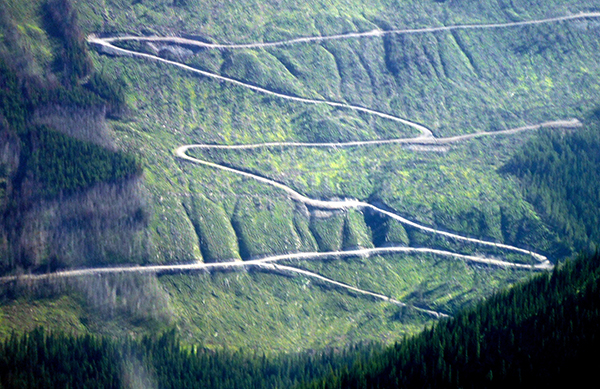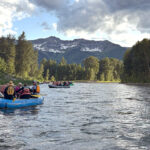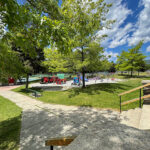Home »

Let’s log to improve the forest instead of destroying it
 “Perceptions,” by Gerry Warner
“Perceptions,” by Gerry Warner
Op-Ed Commentary
Was it all just a lie?
It’s hard to avoid thinking that when you consider all the sawmill closures that have taken place in the province this year. And more to come.
The “lie,” of course, is that logging in B.C. is done on a sustainable basis. Don’t believe that for a second. Believe your own eyes. This point was driven home to me in a recent small plane trip I took from Cranbrook up the Bull River valley to Whiteswan Lake and back.
Appalling is the only way to describe it.
From the time we took off from the Canadian Rockies International Airport, past Mt. Fisher and the Steeples to when we could see the forks of the White River flowing east and north of Whiteswan Lake, the gruesome sight was the same – endless valleys pockmarked with jagged, brown clear cuts – some of them hundreds of acres in size, breaking up the green canopy of the once verdant forest below.
It was enough to make you cry or get awfully angry. In my case more the latter.
Okay, before you accuse me of being a bleeding-heart environmentalist or a forest “greenie,” let me say a few things. I have worked in the forest industry. I heat my house partially with wood and I own a chainsaw. I fully acknowledge there are millions of trees out there and I see nothing wrong with cutting some of them down. In fact, many of them down.
But not the brutal and wasteful way we’re doing it, which is an abomination to the environment, a trigger for climate change, a cause of erosion and flooding and a degradation of our habitat for both man and beast. And what’s worse is it doesn’t need to happen at all. Let me explain.
There’s nothing wrong per se with cutting down a tree. Most of us have done it at one time or the other. But when heavy, technologically efficient equipment is used to cut down trees and entire forests are mowed down in a blitzkrieg attack, things start going sideways in a hurry. And what I’ve just described is how logging is carried out in “beautiful” B.C. today.
The usual term for it is “industrial logging” and the problem is a matter of scale more than anything else. Heavy equipment means heavy destruction. There’s no way around it. But it’s not the equipment’s fault. It’s the way the equipment is used and for that the blame rests squarely with forestry philosophy as practised by professional foresters and forest companies today.
That philosophy or policy is relatively simple and don’t let any forester or industry spokesman tell you any different. The model in use today, and for most of the last hundred years, is to liquidate the forest to bare ground (a clear cut), send the best of what’s been cut to the mills (high grading) and the rest becomes slash, which is usually burned, adding tons of carbon to the atmosphere and contributing in a major way to climate change, a change for the worse.
I told you it was simple. It’s people, especially politicians and bureaucrats, that make simple things complicated.
So, what’s the alternative?
I can tell you right now it’s not to stop logging. The alternative is to log smart. We’re not logging smart now and for that I blame professional foresters who have succumbed to the siren call of industry to log to make as much profit as possible.
We shouldn’t be liquidating the forest at all. We should be farming the forest instead of mining it which is what we currently do. If the forest was logged using best silvicultural practices a mix of tress would be harvested and sent to the mill while sufficient trees would be left behind to re-seed the forest floor and the floor itself would remain largely intact instead of becoming an ugly clear cut and an affront to both nature and man. Replanting costs would be saved too.
Of course, it’s not quite that simple but it’s a hell of a lot better than the mayhem going on in the bush today. Log smart. That’s the model. Don’t you think it’s time we tried it?
Lead image: Clear cut logging in the Bull River Valley. Gerry Warner Photo
– Gerry Warner is a retired journalist who believes the forest could actually be improved by “smart” logging.







